Best Trusts Lawyers in Karachi
Share your needs with us, get contacted by law firms.
Free. Takes 2 min.
List of the best lawyers in Karachi, Pakistan

Bharucha & Co. (Advocates & Intellectual Property Attorneys-Pakistan)
15 minutes Free ConsultationPakistan Trusts Legal Questions answered by Lawyers
Browse our 1 legal question about Trusts in Pakistan and read the lawyer answers, or ask your own questions for free.
- proof of legal heir
- I am nominated by my uncle for his property after his death, he does not have any legal heir parents, sister, brothers, children, and wife. i need to get the succession certificate, but how can I prove to the court that there is no legal heir for my uncle now,... Read more →
-
Lawyer answer by SJ Law Experts
Thank you. SJ Law Experts, Islamabad [Advocates, Legal Advisors & Immigration Lawyers].
Read full answer
About Trusts Law in Karachi, Pakistan:
Trusts are legal arrangements where assets or properties are held and managed by one party (known as the trustee) for the benefit of another party (known as the beneficiary). In Karachi, Pakistan, trusts are governed by the Trusts Act, 1882. Trusts serve various purposes, such as asset protection, estate planning, charitable endeavors, and family wealth management.
Why You May Need a Lawyer:
While it is not mandatory to involve a lawyer in creating a trust, seeking legal advice can be crucial in various situations:
- If you are unsure about the legal implications of creating a trust and wish to understand the process better.
- If you need assistance in drafting a trust deed that accurately reflects your objectives and protects your interests.
- If you want to ensure compliance with all legal requirements while setting up and managing a trust.
- If you encounter disputes or conflicts related to the administration of a trust.
- If you wish to modify an existing trust or terminate it.
Local Laws Overview:
The key aspects of local laws related to trusts in Karachi, Pakistan include:
- The Trusts Act, 1882, provides the legal framework for trusts, covering aspects such as creation, administration, and termination of trusts.
- The Act defines the roles and responsibilities of trustees, beneficiaries, and settlors (the person creating the trust).
- Trusts must be created voluntarily, and the trust property should be clearly identified and distinguished from personal assets.
- The Act also outlines the rights and powers of trustees, including investment decisions and management of trust assets.
- Trustees have a legal duty to act in the best interests of beneficiaries and maintain transparency in trust administration.
- Provisions related to trust taxation are governed by the Income Tax Ordinance, 2001, and should be carefully considered while managing a trust.
Frequently Asked Questions:
Q: Can I create a trust for charitable purposes in Karachi?
A: Yes, you can create a charitable trust in Karachi to support causes such as education, healthcare, poverty alleviation, and more. Consult with a lawyer to ensure compliance with legal requirements.
Q: Can I be a trustee and beneficiary of the same trust?
A: Yes, it is possible to be both the trustee and beneficiary of the same trust in Karachi. However, it is important to ensure that the trust deed and administration adhere to legal guidelines.
Q: How can I modify or terminate a trust?
A: Modification or termination of a trust in Karachi may be possible if certain conditions are met. Consult with a lawyer to understand the process and legal implications.
Q: What happens if a trustee breaches their responsibilities?
A: If a trustee breaches their responsibilities, beneficiaries have the right to take legal action. The court may remove the trustee and appoint a new one to ensure the proper administration of the trust.
Q: Are trusts subject to taxation in Karachi, Pakistan?
A: Trusts in Karachi may be subject to taxation. It is essential to consult a tax expert or lawyer to understand the tax obligations and implications of your specific trust arrangement.
Additional Resources:
For further information and assistance related to Trusts in Karachi, Pakistan, you may find the following resources helpful:
- The Trusts Act, 1882 - Read the complete legal text of the Act to gain comprehensive knowledge about trusts.
- Karachi Bar Association - Contact the local bar association for recommendations of trusted lawyers specializing in trusts.
- Securities and Exchange Commission of Pakistan (SECP) - Visit the SECP website for guidelines and regulations related to trusts.
Next Steps:
If you seek legal assistance in trusts in Karachi, Pakistan, follow these steps:
- Identify your trust-related needs and objectives.
- Research and shortlist experienced lawyers specializing in trusts.
- Schedule initial consultations to discuss your specific situation.
- Choose a lawyer who understands your requirements and offers reliable advice.
- Work closely with your chosen lawyer to draft or manage your trust effectively.
Lawzana helps you find the best lawyers and law firms in Karachi through a curated and pre-screened list of qualified legal professionals. Our platform offers rankings and detailed profiles of attorneys and law firms, allowing you to compare based on practice areas, including Trusts, experience, and client feedback.
Each profile includes a description of the firm's areas of practice, client reviews, team members and partners, year of establishment, spoken languages, office locations, contact information, social media presence, and any published articles or resources. Most firms on our platform speak English and are experienced in both local and international legal matters.
Get a quote from top-rated law firms in Karachi, Pakistan — quickly, securely, and without unnecessary hassle.
Disclaimer:
The information provided on this page is for general informational purposes only and does not constitute legal advice. While we strive to ensure the accuracy and relevance of the content, legal information may change over time, and interpretations of the law can vary. You should always consult with a qualified legal professional for advice specific to your situation.
We disclaim all liability for actions taken or not taken based on the content of this page. If you believe any information is incorrect or outdated, please contact us, and we will review and update it where appropriate.













